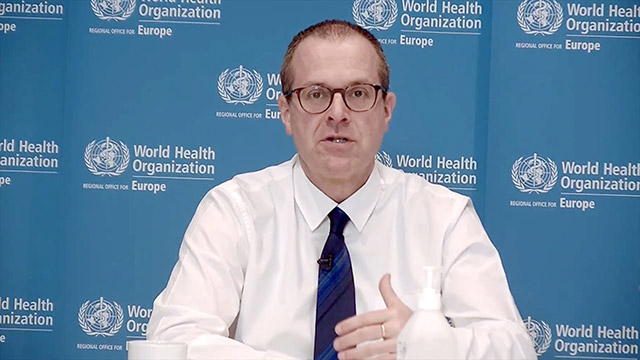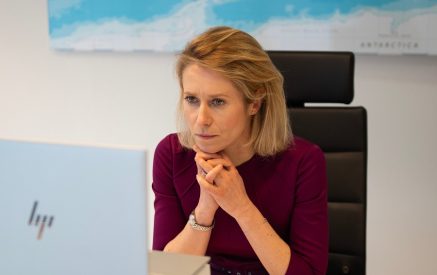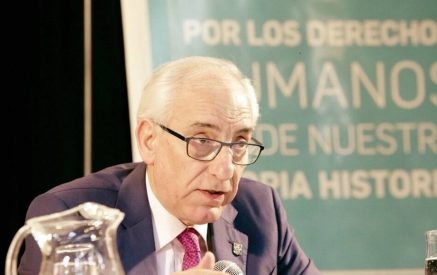Statement by WHO Regional Director for Europe, Dr Hans Henri P. Kluge
It is now 13 days since the military offensive began in Ukraine, and today within the country we see a health system under severe pressure, and beyond its borders the fastest growing refugee crisis in Europe for more than 75 years.
In these difficult days WHO’s priorities are threefold:
Firstly, we are working to get the health supplies that are needed into Ukraine, and ensure a sustainable system of “safe passage” for the delivery of humanitarian health supplies to where they are needed within the country. I have been working closely with Amin Awad, Assistant Secretary-General and UN Crisis Coordinator for Ukraine, to establish such a route. Lifesaving essential medicines, such as oxygen and insulin, personal protective equipment, surgical supplies, anesthetics, and safe blood products, are in short supply. So far, two shipments totaling 76 tonnes of trauma and emergency health supplies, as well as freezers, refrigerators, ice packs, and cool boxes are in transit in Ukraine. We have further shipments of 500 oxygen concentrators and more supplies are on their way
Read also
A second priority is to ensure that neighbouring countries have the infrastructure and expertise in place to meet the urgent health needs of those arriving. According to UNHCR, more than 1.7 million people, the vast majority women and children, have left Ukraine since 24 February. All those seeking refuge, including third-country nationals who had been residing in Ukraine, must be granted movement across Europe.
We have deployed expert WHO teams to Hungary, Poland, the Republic of Moldova and Romania – and we are working with UNHCR and coordinating closely with the relevant governments, local authorities and partners to assess the needs of incoming refugees upon entry at the border, build health system capacity to accommodate large numbers of refugees and ensure access to services. WHO emergency response partner networks have also been mobilized, with 20 emergency teams already on the ground and more than 25 more poised to support.
I oversaw the arrival of the first shipment of WHO supplies, and had the opportunity to meet a few of the people who had recently arrived from Ukraine when I visited the border area of Rzeszow in Poland last Thursday. I saw more than exhaustion and relief. Looking into people’s eyes – there is uncertainty and anguish among children and women. Their health needs encompass services for vaccine preventable diseases, maternal, newborn and child health, non-communicable diseases, HIV and TB, and not least, mental health and psychosocial support. Let me add that the welcome they have received from local people and health care staff has been phenomenal.
Next week, we will be holding a long-planned meeting on refugee and migrant health in Turkey. This meeting will bring together health ministers, representatives of refugee and migrant groups, partner organizations and the WHO African and Eastern Mediterranean regions, to address current events, but also look beyond the current situation. Through political commitment and partnership, we seek to establish a new vision for the health of refugees and migrants, across the European Region and further afield. This meeting will be an opportunity to take account of current needs in a longer-term context, recognizing the potential of migration to contribute to thriving, healthy populations and to ensure an economy of well-being for all.
Our third focus at this moment is to provide support on immediate health requirements within Ukraine through a fully-functioning WHO operations centre on the ground in Ukraine. We are responding to the urgent need for trauma and injury support with rapid refresher training, supplies and staffing through the mobilization of medical teams.
Continuity of care for those with long-term health needs is a major challenge because broken supply lines are affecting the treatment of conditions such as diabetes and hypertension, as well as for cancer.
According to UNFPA, an estimated 80,000 women will give birth in the next three months without access to critical maternal care.
Re-establishing and maintaining vaccination programmes and continuing treatment for people living with TB and HIV, are priorities, as is the provision of mental health services.
We are working to support these essential medical needs though fixed facilities and field hospitals or mobile health services and by making key diagnostics, medicines and medical supplies available.
It should not need saying that health workers, hospitals and other medical facilities must never be a target at any time, including during crises and conflicts. To date, we have 16 confirmed reports of attacks in Ukraine, and more are being verified. WHO strongly condemns these attacks on health care services.
Today is International Women’s Day, a moment when we should be celebrating the myriad ways in which women improve the world we all live in – including as green entrepreneurs, health pioneers, community champions and political role-models. But as events unfold in eastern Europe, I must recognize their leadership and the need for their voice in this crisis.
Women are the key responders in this humanitarian emergency.
Before 24 February, 71% of households in the conflict areas in Ukraine were already headed by women, and now these numbers are increasing every day. They make up 83% of the country’s health workforce. Women are the breadwinners whilst caring for children and the frail. They are organizing and distributing assistance and aid. And they are risking their lives to deliver life-saving health services.
In conflict situations, and when displaced, women face specific risks and have particular health needs.
Past conflicts have shown us that adolescent girls, women with disabilities and elderly women are in the most vulnerable situation. They face an increased risk of suffering attacks by people outside the home and by armed groups, as well as intimate partner violence and sexual abuse and exploitation.
The health needs of women and girls, including emergency obstetric care, maternal health, reproductive health, and response to sexual and gender-based violence must be prioritized.
Women are key players in reducing conflict and advancing stability as their participation increases the chances of ensuring lasting conflict resolutions and peace, yet they almost always remain absent from negotiations.
On this International Women’s Day, I express my deep appreciation for their invaluable contribution to health and well-being today and every day. And I will work to ensure that the specific health needs of women and girls are embedded in the response to this humanitarian crisis.
Let me now provide a brief update on the COVID-19 situation in Ukraine and across the European Region.
Remarkably, despite the events that have unfolded, Ukraine has maintained its COVID-19 surveillance and response system. I commend my Ukrainian colleagues in this regard and encourage them to continue. 731 COVID-19 deaths were reported to WHO from Ukraine last week, and sadly this number will increase as oxygen shortages continue. Older people will be disproportionately affected as their access to healthcare is disrupted, and because only one third of the over-60s are fully protected with a complete vaccine series.
Across the WHO European Region, cases of COVID-19 are declining week on week, and the number of deaths has also fallen every week since 10 February. While this is good news, I would call on countries to balance optimism with maintaining vaccination and strong vigilance, and ensure that any lifting of public health and social measures including testing, can be reintroduced quickly if and when required.
Finally, it is my deepest sorrow to see my Region emerging from two terrible pandemic years being now confronted with the devastating impact of military hostilities on millions of people in Ukraine and beyond. Through personal experience in other conflicts, I firmly believe that health and humanitarian principles remain key drivers of peace and I am using all diplomatic resources that are at my disposal as elected WHO leader to reduce the impact of this human catastrophe.






















































